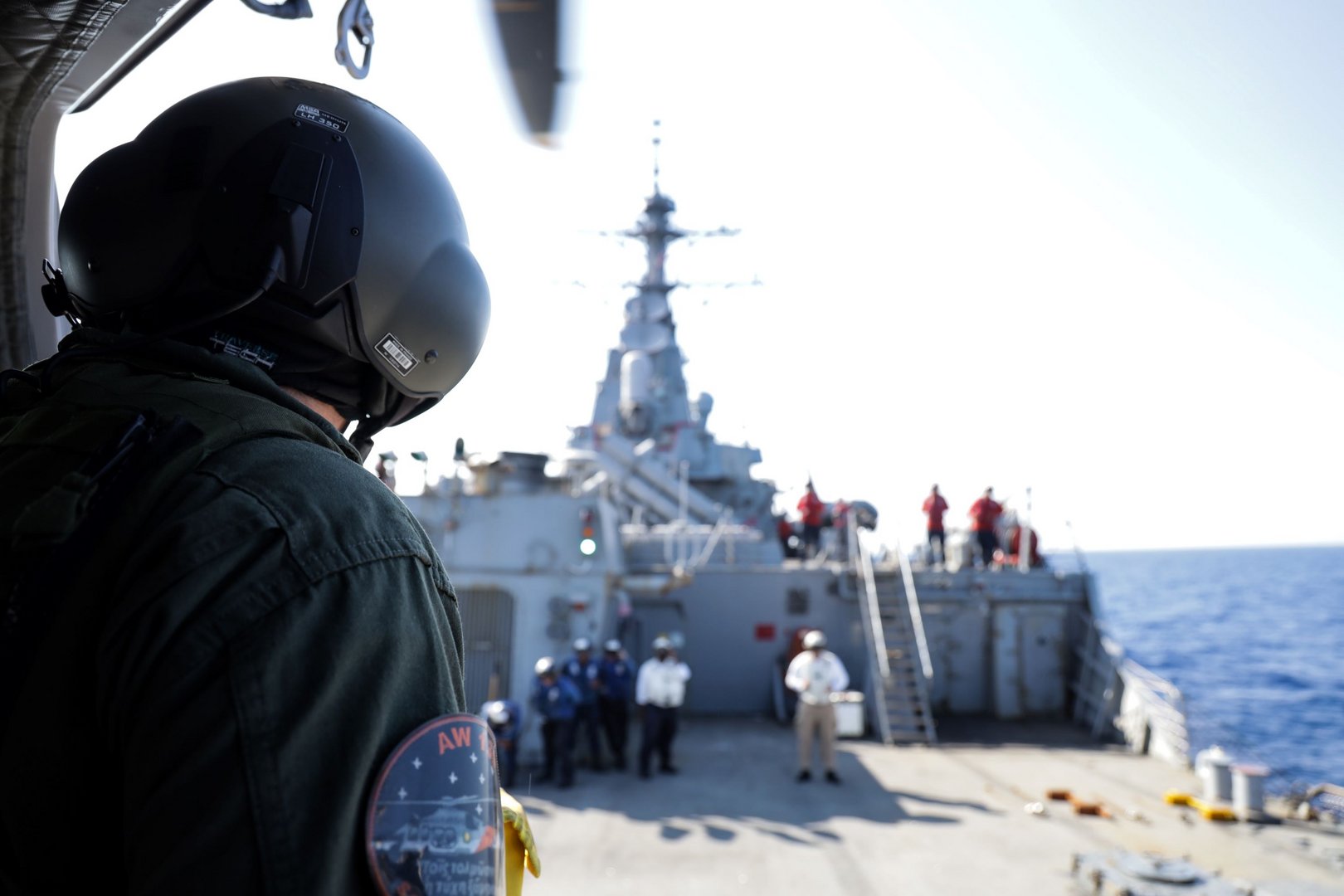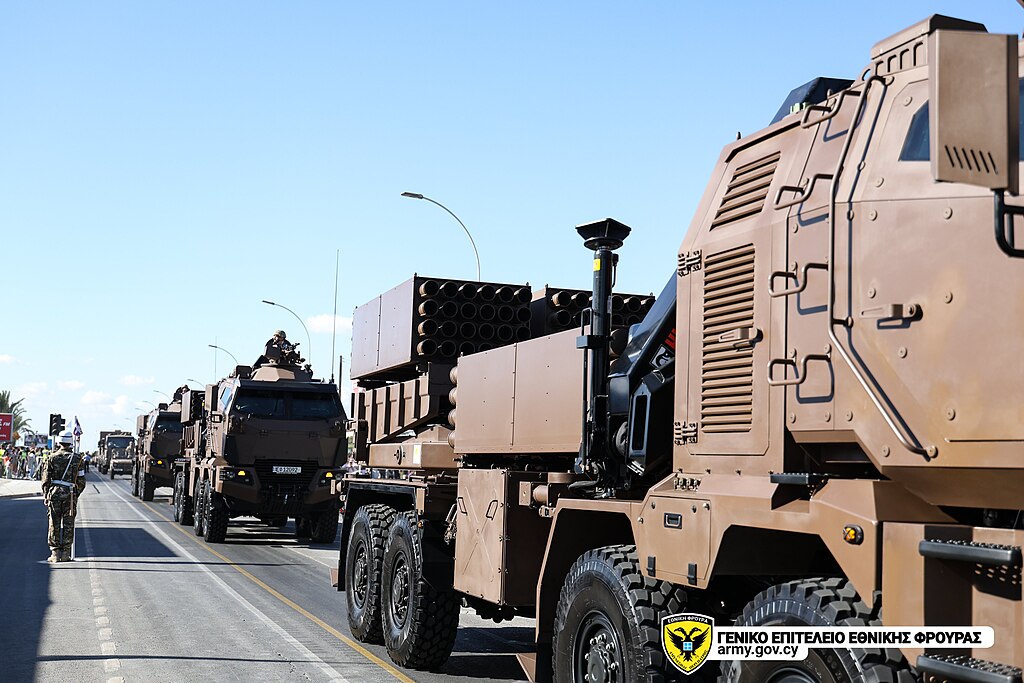Closer ties with Israel and the US have seen the arrival of improved defence systems
With increased defence spending recently announced, the Cyprus military has acquired some impressive weapons systems, provoking a reaction – if perfunctory – from Turkey. The choice of weapons almost inevitably mirrors the country’s emphatic reorientation toward the West but also toward Israel.
The state budget for 2026 comes to €13.7 billion, of which €176.8 million has been allocated to armaments spending.
Data provided by the defence ministry show that since 2023 annual outlays on arms have consistently hovered above the €170 million mark.
The state budget cites only the total armaments amount for next year – the €176.8 million. But an itemised breakdown of the gizmos the military has its eye on is contained in a classified document to be submitted by the defence ministry to parliamentary committee at a closed-doors session.
The €176.8 million allocations for 2026 will be used to implement both existing and new contracts aimed at enhancing the military’s defensive and deterrent capabilities.
Three more H145Μ attack helicopters – manufactured by Airbus Helicopters, a French-German company – will be purchased in 2026, adding to the three existing ones. The six H145Μs will replace the fleet of 11 Russian Mi-35Ps sold to Serbia for a reported €105 million.
Altogether, the six H145Μs carry a price tag of €140 million, paid in instalments. The deal was signed in June 2022.
Last week’s Independence Day parade showcased some of the National Guard’s shiny new toys. But beyond the glitz, the annual event set off the customary discussions about the state of the military and who Cyprus’ ‘friends’ are.

One of the weapons systems showing up at the parade was the Serbian-made Tamnava multiple rocket launcher. The Tamnava was ordered and brought to Cyprus in total secrecy.
The turn to the Serbian market is the result of defence deals signed over the last few years between the two countries’ respective defence ministries.
It really kicked off in 2017 with the acquisition from Serbia of the Nora B-52 self-propelled howitzers. These were transferred to Cyprus in stages, completed in December 2020. The Nora B-52 can fire up to 11 shells per minute and has GPS guidance.
Neighbouring Israel meanwhile has become a significant market for the Cyprus military, reflecting the close diplomatic ties between the two nations. Years ago, the National Guard acquired the Tavor assault rifle from Israel, which became the mainstay for the commandos unit. This also involved a switch from 7.62mm ammunition to 5.56mm, the Nato standard.
Cyprus also purchased the new Barak MX air defence system from Israel. Talks had begun back in 2021. The system is being transferred to Cyprus piece by piece, and it’s thought that by the end of the year it will go fully operational.
Again, this is being done under cloak and dagger. Nevertheless, in early September a convoy of trucks was spotted in Limassol in the dead of night transporting what was assumed to be the Barak MX. Sharp-eyed locals posted footage of the trucks rolling through the streets under heavy security.
The modular Barak MX is designed to defend both land and sea targets. It uses advanced radar, active sensors, and an integrated command system to intercept aircraft, drones, cruise missiles and even ballistic missiles at ranges up to 35km.
News of delivery of the system sparked a strong reaction from Turkey. Critics in Ankara, including the deputy leader of the Republican People’s Party, labeled the system’s arrival a “direct threat” to Turkish national security, claiming it could monitor air activity as far as southern Turkey from a potential Paphos installation.
Regarding the United States, and the lifting of the arms embargo, the process for acquiring American weapons systems is still ongoing. National Guard staffers are currently assessing certain items included on a list sent by Washington.
Ending the reliance on Russian armaments is a work in progress. The acquisition of the Israeli air defence system already covers, to a significant degree, the potential furloughing of Russian air defence systems. For now, the Russian systems are incorporated into the air defence shield. They will remain operational, and in the future the Cyprus military will re-assess what to do with them once spare parts and ammunition are no longer available.

As to the main battle tanks, the army is reportedly mulling gradually replacing the Russian T-80s with newer tanks. Options are being considered from the United States, Germany and Israel.
According to an analysis by daily Politis, the armaments pivot to the West got underway in the wake of the 2013 financial crisis – way before the sanctions imposed on Russia for its 2022 invasion of Ukraine. Dealings with Israel likewise predate the sanctions on Russia.
In tandem with weapons acquisitions, the National Guard is upgrading its infrastructure. This includes upgrades to the Mari naval base and expansions to the Andreas Papandreou airbase in Paphos.
Defence sources told Politis that Cyprus is also heavily engaged in ‘defence diplomacy’ – defined as utilising a country’s defence and military capabilities to achieve foreign policy goals through peaceful means. It involves activities like military-to-military exchanges, joint exercises, defence trade and security assistance.
The enhancement of ties with other nations has three pillars. Under the first, Cyprus has developed bilateral cooperation in defence and security with countries like Austria, France, Germany, Portugal, Italy, the Netherlands, Romania and Slovakia.
The second pillar sees Cyprus broadening its collaboration with regional countries like Israel, Egypt, the United Arab Emirates, Saudi Arabia, Jordan and Lebanon.
Also, enhanced ties with the United States. The National Guard has already procured non-lethal gear from the United States, such as night-vision goggles and bomb disposal robots. Also, joint military and training exercises are held every year with US forces.
The third pillar relates to the EU Common Security and Defence Policy. The defence ministry participates with officers in several EU institutions, such as the European Union Military Staff and the European Defence Agency. Cyprus also takes part in nine programmes of the Permanent Structured Cooperation (Pesco).
Last but not least, Cyprus has engaged with the European Union’s Safe programme. In early September the European Commission green-lit the disbursement of over €1 billion to Cyprus.
The Safe programme foresees that EU member states and allies will join forces to carry out “common procurements” for military hardware.
Safe will provide long-term, low-cost loans to help EU member-states procure urgently needed defence equipment. Member states can now prepare their national investment plans, describing the use of the possible financial assistance, to be presented by the end of November. The Commission will then assess these national plans, with the aim of making the first disbursements in early 2026.
But where does it all leave Cyprus? What are the risks? And do the armaments procurements show the island has become a pawn of the United States and/or Israel? Is that an issue?
Director of the Cyprus Research Centre think tank Christos Iacovou doesn’t think so.

He said Cyprus, due to its geopolitical location and the generally volatile regional environment, as well as the ongoing Turkish occupation, seeks an “outlet” by participating in collective security system and defence partnerships with countries with common interests – Greece and Israel.
“The Greece-Cyprus-Israel strategic partnership serves as a counterweight to Turkey’s provocative and aggressive posture in the eastern Mediterranean,” the expert told the Cyprus Mail.
“Within the geopolitical milieu of the eastern Mediterranean, Turkish revisionism is evident. Turkish aggressiveness, combining military aggression with hybrid threats and the geopolitical weaponisation of matters such as migration, puts at risk the security not only of Cyprus and Greece, but Israel as well.”
According to Iacovou, Israel – a state with “limited strategic depth” – has throughout the years faced threats from a series of hostile regional powers, some of which maintain close ties with Turkey.
In this environment, he opined, Cyprus becomes the sole stable and reliable regional ally to Israel.
“The importance of Cyprus to Israel’s security cannot be underestimated. Its geographical location, its political stability and its strategic scope give Israel the strategic depth it so needs – not only in peacetime, but chiefly in times of crisis and war.”
The expert also weighed the pros and cons.
“As often happens in partnerships between a militarily powerful state and a weaker state, there are advantages and potential disadvantages. In the case of Cyprus and Israel, one may look at this gradualistically in relation to the possibility of Israel and Turkey restoring their strategic relationship, which would downgrade Cyprus as a strategic partner, as was the case in the 1990s.”
He added: “Moreover, the close ties between Cyprus and Israel could make the country the target of various Islamic groups. Likewise significant is the boosting of Cyprus’ defence capabilities by Israel. I don’t consider that a problem, since up until now Cyprus had been unable to purchase various weapons systems due to the well-known restrictions imposed in the wake of the Turkish invasion.
“We need to look at the issue of bolstering Cyprus’ defences both gradualistically but also in relation to Turkey’s hegemonic conduct in the region and the coercive diplomacy it has exercised against Cyprus for decades.”






Click here to change your cookie preferences